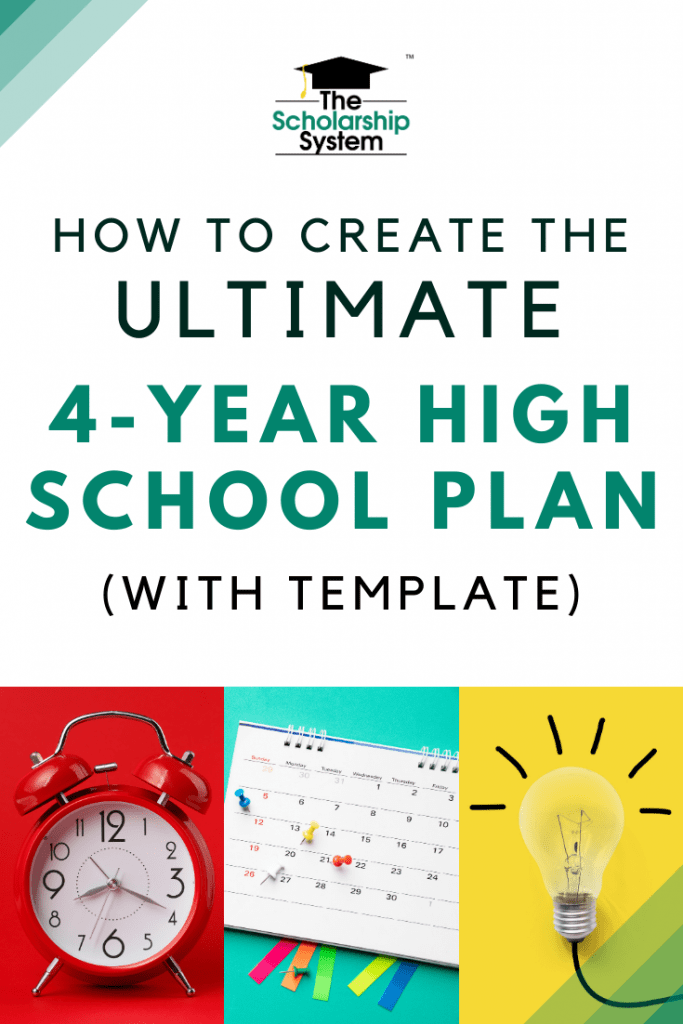Updated on October 18th, 2024
When your student gets ready to start high school, it’s an exciting time. It’s a big life step on the path toward becoming an adult, a moment that’s both exhilarating and, often, a tad anxiety-inducing. Luckily, by creating a 4-year high school plan, your student can chart a course toward success with a comprehensive college prep guide.
College is just four years away. How a student navigates their time in high school has a substantial impact on their future prospects, which is why having a high school 4-year plan in place is so critical. It can put them on the road toward their preferred college and make it easier for them to land scholarships.
That’s right. An excellent 4-year high school plan can help your student earn valuable scholarships, ensuring they can attend the college of their choice affordably. If you and your student want to discover more about the scholarship process, including where to find them and how to apply, sign up for our free college scholarship webinar! Take a trip over to http://thescholarshipsystem.com/freewebinar to reserve your spot today.
If you’d like to learn more about how to create the ultimate 4-year high school plan, here’s what you need to know.
Contents
- 1 How to Create the Ultimate 4-Year High School Plan
- 1.1 Understanding the Importance of Planning Ahead
- 1.2 Daydream About the Future
- 1.3 Learn the High School Graduation Requirements
- 1.4 Choose the Right Electives
- 1.5 Embrace Extracurricular Activities and Volunteering Opportunities
- 1.6 Create a Tentative Course Schedule
- 1.7 Create a Progress (and Accomplishment!) Tracking System
- 1.8 Learn About the PSAT, SAT, and ACT
- 1.9 Explore AP Classes and Exams
- 1.10 Learn About Career Options
- 1.11 Making the Most of Your Summers
- 2 The Ultimate 4-Year High School Plan Template
How to Create the Ultimate 4-Year High School Plan
Understanding the Importance of Planning Ahead
Planning ahead is crucial for academic success in high school. By creating a four-year plan, students can set clear goals, stay organized, and make informed decisions about their academic journey. A well-planned high school experience can help students earn college credit, participate in extracurricular activities, and gain valuable skills and knowledge that will benefit them in the long run. Moreover, planning ahead can help students stay focused and motivated, ensuring they meet their high school graduation requirements and achieve their academic goals.
Daydream About the Future
While this may seem like an odd first step, it’s an important one. Students need to figure out what kind of future ignites their passion.
When students are excited about what the future holds, they are typically more focused, dedicated, and engaged. This can make weathering challenges easier, as they know they are moving toward something they genuinely want.
This doesn’t mean students need to have it all “figured out.” While some high school freshman may have their eye on a particular career, others won’t. They may merely know what subjects they enjoy or what skills are fun to use, and that’s okay. At times, they may simply have an idea of the kind of lifestyle they want, and that’s alright, too.
Encourage your student to do a little daydreaming. If they don’t know where to begin, they can use these questions to get their creative juices flowing:
- Do I already know what my dream job/career is? What about my dream college?
- What kind of lifestyle do I want? For example, do I want to live in a city? How do I feel about traveling for work?
- What are my strengths, both for school subjects and skills? Where do I struggle?
- Which classes or subjects are my favorites?
Questions like these can help your student identify goals and preferences. Then, they can use that information to create their 4-year plan for high school starting from their freshman year.
Learn the High School Graduation Requirements
Graduation requirements, surprisingly, aren’t universal. Plus, some high schools have several graduation approaches, each with a different difficulty level. As a result, it’s wise for your student to learn exactly what they need to do to graduate and how participating in one of the more challenging plans (if available) may benefit them. Understanding a high school’s graduation requirements is a foundational step in this process.
Usually, your student’s best bet is to talk to their high school guidance counselor. That way, they can ask questions like:
- How many credits do I need in each subject area?
- Do some required courses have prerequisites?
- Am I a potential AP course candidate?
- Are there courses available that can lead to college credit that I should consider?
- Are certain classes harder to get into or in higher demand? If so, what do I need to do to secure a spot?
These questions will give your student information that can help them choose classes in advance. That way, when they start filling out the four-year plan template, they have an idea of what class they should be taking when.
Choose the Right Electives
Electives are unique opportunities. Students can use them to explore interesting subject areas, make them stand out in college admissions teams’ eyes, and even secure scholarships. Plus, many electives are fun, and that can be important, too.
Students have choices when it comes to electives. Your student should explore the options that may fit into their schedule, and see which ones ignite their passion, make them feel curious, or advance them toward their goals.
Embrace Extracurricular Activities and Volunteering Opportunities
Extracurricular and volunteer opportunities can make a big difference when it comes time to apply for college. Plus, many of them are enjoyable and have excellent opportunities to socialize with others who share your student’s interests.
Students should seek opportunities that allow them to be part of a team, lead, or contribute to their communities. It will inevitably broaden their horizons, making the experience worthwhile.
However, students should be cautious not to take on too much. It’s better to participate in one extracurricular activity or volunteer experience fully than to do several poorly. As a result, encourage your student to examine the commitment required for any new activity, ensuring they can fit it into their schedule without overdoing it.
Create a Tentative Course Schedule
Creating a tentative course schedule is an essential part of a four-year high school plan. Students should work with their school counselor to create a balanced schedule that includes a mix of core subjects, elective courses, and challenging courses that align with their interests and goals. The schedule should also take into account the high school’s graduation requirements, ensuring students meet all the necessary credits to graduate. Additionally, students should consider taking AP classes or honors courses to earn college credit and demonstrate their academic abilities to their preferred college.
Create a Progress (and Accomplishment!) Tracking System
Keeping track of school work, college application deadlines, scholarship due dates, and more can be daunting. Add in that students should take notes about their accomplishments, ensuring they can highlight them in college applications and scholarship essays. It could quickly become overwhelming.
Ideally, freshmen should choose a tool that can work as a high school 4-year planner for this exact purpose. It could be as simple as a few spreadsheets and an online calendar or as complex as project management software. Whatever works for them is the way to go, ensuring they can stay on top of their responsibilities while tracking their achievements.
Learn About the PSAT, SAT, and ACT
It’s always wise for students to plan ahead for standardized tests. The PSAT usually comes along during a student’s sophomore year, though the exact date may vary. The SAT and ACT are typically available regularly throughout the year.
By learning when the exams occur, your student can determine when they should start studying. Additionally, they can choose test dates that allow them to retest if they aren’t thrilled with their scores.
Explore AP Classes and Exams
While your student should speak to their counselor about AP courses, it’s always wise to do a little exploration. Often, students take AP classes later in their high school careers, so yours may be able to work their way up towards them if they aren’t already eligible to participate.
At a minimum, your student may want to find out about AP classes that align with their academic strengths. That way, they can prepare to participate and take the corresponding AP exams, allowing them to earn college credit before their high school graduation.
Learn About Career Options
If your student is curious about several careers, why not explore them. If they know someone who works in the field or can connect with a professional who may be able to give them valuable insight, it’s wise to reach out.
Whether your student has a chance to conduct an informational interview or participate in a job shadowing day, what they learn can be critical. It may help them determine what career path is right for them, ensuring they can focus their efforts in the best direction as early as possible.
Making the Most of Your Summers
Making the most of your summer break is a great way to enhance your high school experience and prepare for college. Students can use their summers to take online courses, attend summer programs, participate in internships, or engage in community service. These activities can help students earn college credit, gain valuable skills and knowledge, and build their resume. Moreover, summers provide an opportunity for students to explore their interests, develop new skills, and gain experience in their intended major. By making the most of their summers, students can stay ahead of the game, achieve their academic goals, and increase their chances of getting into their dream college.
The Ultimate 4-Year High School Plan Template
Sometimes, the easiest way to get a plan in place is with a handy 4-year plan template. This can guide your student along, ensuring they consider their options and have a strategy for handling graduation requirements. Consulting with school counselors can provide valuable insights and support during this process.
With that in mind, here’s a quick 4-year high school plan template that any student can use as a starting point.
If you and your student want to discover more about the scholarship process, including where to find them and how to apply, sign up for our free college scholarship webinar! Take a trip over to http://thescholarshipsystem.com/freewebinar to reserve your spot today.









Leave a Reply